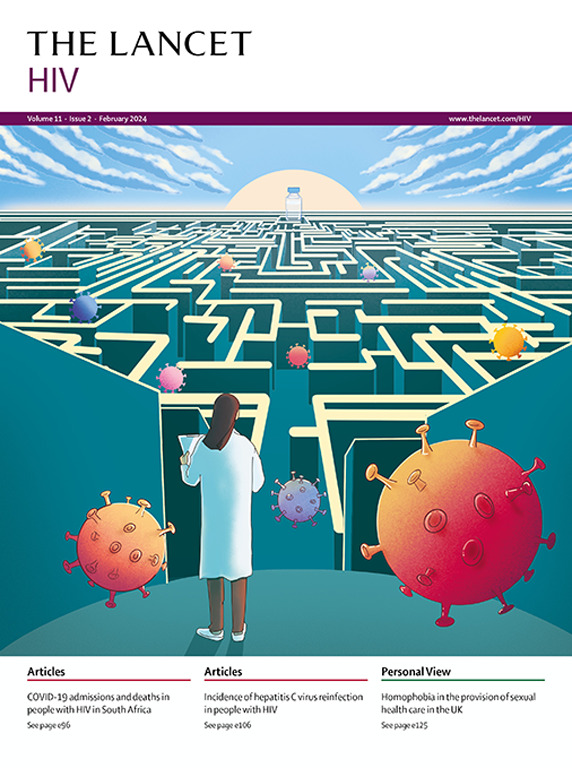Safety, tolerability, and immunogenicity of an adult-specific pneumococcal conjugate vaccine, V116, in people living with HIV (STRIDE-7): a two-part, parallel-group, randomised, active comparator-controlled, international, phase 3 trial.
IF 13
1区 医学
Q1 IMMUNOLOGY
引用次数: 0
Abstract
BACKGROUND People living with HIV are at high risk of pneumococcal disease, and evidence of pneumococcal conjugate vaccine (PCV) safety and efficacy is needed. We aimed to evaluate the safety, tolerability, and immunogenicity of V116 (an adult-specific 21-valent PCV) in this population. METHODS This two-part phase 3 trial was conducted at 20 centres in Belgium, Chile, France, South Africa, Thailand, and the USA. Part A was a randomised, active comparator-controlled, parallel-group, multicentre, double-blind trial in adults aged 18 years or older living with HIV (CD4 counts ≥50 cells per μL, plasma HIV RNA load <50 000 copies per mL, and combination antiretroviral therapy for ≥6 weeks). In part A, participants were randomly assigned (1:1), using an interactive response technology system, to receive V116 followed by placebo 8 weeks later or 15-valent PCV (PCV15) followed by 23-valent pneumococcal polysaccharide vaccine (PPSV23) 8 weeks later. Part B was an open-label trial of PCV15 after receiving V116 in part A (once all participants completed follow-up). Unmasked study personnel administered a 0·5 mL intramuscular dose of each vaccine. The funder, site staff, data management team, and participants were masked. Blood samples were collected on day 1 and at 30 days and 12 weeks post-vaccination in part A and on days 1 and 30 in part B. The primary outcome in part A, assessed in the per-protocol population, was serotype-specific opsonophagocytic activity geometric mean titres 30 days post-vaccination for the 13 serotypes common to V116 and PCV15 plus PPSV23 and for the eight serotypes unique to V116. Part B was exploratory. Immunogenicity was assessed using descriptive statistics. This study is registered with ClinicalTrials.gov, NCT05393037, and EudraCT, 2021-006710-36 (completed). FINDINGS Adults were enrolled and followed up in part A between July 13, 2022, and July 13, 2023, and in part B between Oct 18, 2023, and Jan 25, 2024. 313 participants were randomly assigned (156 in the V116 plus placebo group and 157 in the PCV15 plus PPSV23 group) and 304 (97%) completed part A (152 in each group). 126 (81%) of 155 participants in the V116 plus placebo group as-treated population from part A received PCV15 in part B (administration interval median 11·4 months [range 9·5-16·9]). 221 (71%) participants were male and 91 (29%) were female. The mean age was 45 years (SD 13). V116 was immunogenic for all 21 serotypes contained in the vaccine, and immune responses on day 30 were generally similar to those seen with PCV15 plus PPSV23 at week 12 for the 13 common serotypes and higher for the eight serotypes unique to V116. In part A, fewer participants had at least one adverse event in the V116 plus placebo group (111 [72%] of 155 vs 141 [91%] of 155 in the PCV15 plus PPSV23 group) with a lower frequency of injection-site adverse events (79 [51%] vs 130 [84%]); serious adverse events were low (four [3%] vs six [4%]) and none were vaccine related. One non-vaccine-related death with an unknown cause occurred in part A in the V116 plus placebo group. INTERPRETATION V116 was well tolerated and immunogenic for all 21 serotypes, supporting the use of this vaccine in adults living with HIV. Adults at high risk of pneumococcal disease due to underlying comorbid conditions, such as HIV, might benefit from receiving V116. The serotypes in V116, including the eight unique serotypes, are expected to provide broader protection against pneumococcal disease than currently licensed vaccines. FUNDING MSD.成人特异性肺炎球菌结合疫苗V116在艾滋病毒感染者中的安全性、耐受性和免疫原性(STRIDE-7):一项两部分、平行组、随机、主动比较对照、国际3期试验
艾滋病毒感染者是肺炎球菌疾病的高危人群,需要肺炎球菌结合疫苗(PCV)安全性和有效性的证据。我们的目的是评估V116(一种成人特异性21价PCV)在该人群中的安全性、耐受性和免疫原性。该3期临床试验分为两部分,在比利时、智利、法国、南非、泰国和美国的20个中心进行。A部分是一项随机、主动对照、平行组、多中心、双盲试验,对象为18岁或以上HIV感染者(CD4细胞计数≥50个/ μL,血浆HIV RNA载量< 50,000拷贝/ mL,联合抗逆转录病毒治疗≥6周)。在A部分,参与者被随机分配(1:1),使用互动反应技术系统,8周后接受V116和安慰剂,或8周后接受15价PCV (PCV15)和23价肺炎球菌多糖疫苗(PPSV23)。B部分是在A部分接受V116后的PCV15的开放标签试验(一旦所有参与者完成随访)。未蒙面的研究人员给每种疫苗肌肉注射0.5 mL。资助者、现场工作人员、数据管理团队和参与者都是蒙面的。A部分在接种疫苗后第1天、第30天和第12周采集血样,b部分在接种疫苗后第1天和第30天采集血样。A部分的主要结果是在接种疫苗后30天评估V116和PCV15加PPSV23共有的13种血清型和V116特有的8种血清型的血清型特异性抗噬细胞活性几何平均滴度。B部分是探索性的。免疫原性采用描述性统计进行评估。本研究已在ClinicalTrials.gov注册,注册号为NCT05393037, eudraft号为2021-006710-36(已完成)。A部分于2022年7月13日至2023年7月13日招募成人并进行随访,B部分于2023年10月18日至2024年1月25日进行随访。313名参与者被随机分配(156名在V116加安慰剂组,157名在PCV15加PPSV23组),304名(97%)完成了A部分(每组152名)。来自A部分的V116加安慰剂组的155名参与者中有126名(81%)在B部分接受了PCV15治疗(给药间隔中位数为11.4个月[范围9.5 - 16.9])。221名(71%)男性,91名(29%)女性。平均年龄45岁(SD 13)。V116对疫苗中包含的所有21种血清型都具有免疫原性,第30天的免疫应答大体上与PCV15加PPSV23在第12周对13种常见血清型的免疫应答相似,对V116特有的8种血清型的免疫应答更高。在A部分,V116 +安慰剂组中至少有一次不良事件的参与者较少(155名患者中有111名[72%]vs 155名PCV15 + PPSV23组中有141名[91%]),注射部位不良事件发生频率较低(79名[51%]vs 130名[84%]);严重不良事件发生率较低(4例[3%]vs 6例[4%]),且均与疫苗无关。在A部分,V116加安慰剂组发生了一例原因不明的非疫苗相关死亡。解释:v116对所有21种血清型均具有良好的耐受性和免疫原性,支持在成人HIV感染者中使用该疫苗。因潜在合并症(如艾滋病毒)而患肺炎球菌疾病风险高的成年人可能受益于V116。V116的血清型,包括8种独特的血清型,预计将比目前许可的疫苗提供更广泛的预防肺炎球菌疾病的保护。
本文章由计算机程序翻译,如有差异,请以英文原文为准。
求助全文
约1分钟内获得全文
求助全文
来源期刊

Lancet Hiv
IMMUNOLOGYINFECTIOUS DISEASES&-INFECTIOUS DISEASES
CiteScore
19.90
自引率
4.30%
发文量
368
期刊介绍:
The Lancet HIV is an internationally trusted source of clinical, public health, and global health knowledge with an Impact Factor of 16.1. It is dedicated to publishing original research, evidence-based reviews, and insightful features that advocate for change in or illuminates HIV clinical practice. The journal aims to provide a holistic view of the pandemic, covering clinical, epidemiological, and operational disciplines. It publishes content on innovative treatments and the biological research behind them, novel methods of service delivery, and new approaches to confronting HIV/AIDS worldwide. The Lancet HIV publishes various types of content including articles, reviews, comments, correspondences, and viewpoints. It also publishes series that aim to shape and drive positive change in clinical practice and health policy in areas of need in HIV. The journal is indexed by several abstracting and indexing services, including Crossref, Embase, Essential Science Indicators, MEDLINE, PubMed, SCIE and Scopus.
 求助内容:
求助内容: 应助结果提醒方式:
应助结果提醒方式:


